Featured
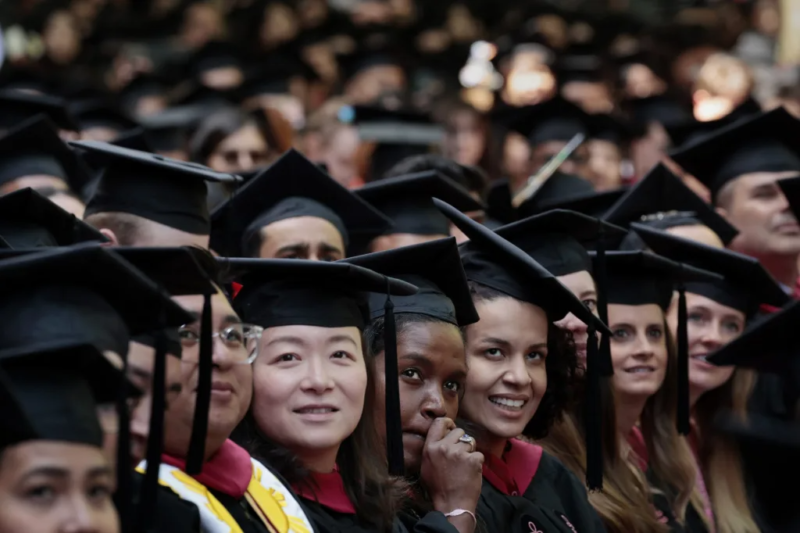 Harvard legacy admissions lawsuit follows affirmative action Supreme Court ruling. By Collin Bindley / AP and Fortune.
Harvard legacy admissions lawsuit follows affirmative action Supreme Court ruling. By Collin Bindley / AP and Fortune.
Students take part in the 372nd Commencement at Harvard University.
A civil rights group is challenging legacy admissions at Harvard University, saying the practice discriminates against students of color by giving an unfair boost to the mostly white children of alumni. It’s the latest effort in a growing push against legacy admissions, the practice of giving admissions priority to the children of alumni. Backlash against the practice has been building in the wake of last week’s Supreme Court’s decision ending affirmative action in college admissions. Read more
Political / Social
 The Supreme Court Made It Even Harder to Close the Racial Wealth Gap. By Hannah Levintova / Mother Jones
The Supreme Court Made It Even Harder to Close the Racial Wealth Gap. By Hannah Levintova / Mother Jones
The result of two major decisions: fewer opportunities and ever more debt.
Two rulings from the nation’s highest court—one striking down the use of race-conscious college admissions, and the second gutting Biden’s student debt cancellation plan—rolled back years of progress towards greater economic justice and educational opportunity for students of color. In these rulings, the Supreme Court has all but ensured the deepening of racial wealth inequality by undoing the chance to erase debt held disproportionately by Black Americans, and also decreasing access for students of color to elite US colleges—and the financial opportunity they can offer their graduates. Read more
 Supreme Court backtracked on Black death row inmates’ racial bias claims, liberal justices say. By
Supreme Court backtracked on Black death row inmates’ racial bias claims, liberal justices say. By
The Supreme Court previously ruled for Mississippi inmate Curtis Flowers on his claim that prosecutors unlawfully blocked Black jurors, but it rejected a similar appeal from another Mississippi inmate, Tony Clark, last week.
“Because this court refuses to intervene, a Black man will be put to death in the state of Mississippi based on the decision of a jury that was plausibly selected based on race,” Justice Sonia Sotomayor wrote in a dissenting opinion joined by Justices Elena Kagan and Ketanji Brown Jackson. The latest appeal was brought by Tony Clark, who was convicted of murdering 13-year-old Muhammed Saeed during a botched convenience store robbery in Canton, Mississippi, in October 2014. During the jury selection process, in which prosecutors and defense lawyers can seek to block potential jurors without giving a reason, Clark claims prosecutors unlawfully focused on removing Black jurors in violation of a 1986 Supreme Court ruling that said people cannot be excluded because of their race. Read more
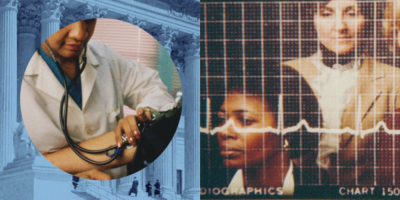 Medical schools will be even less diverse after affirmative action ruling, experts say. By Char Adams / NBC News
Medical schools will be even less diverse after affirmative action ruling, experts say. By Char Adams / NBC News
Experts fear medical and nursing schools will no longer be able to foster diversity by considering race as a factor in their admissions processes.
The Supreme Court’s affirmative action ruling will have far-reaching consequences for Black and Latino students hoping to attend medical school and, in turn, only worsen the health disparities among people of color across the country, experts said. After the high court’s ruling Thursday struck down affirmative action programs at the University of North Carolina and Harvard, many fear that medical and nursing schools and other professional institutions will no longer be able to foster diversity by considering race in their admissions processes. The decision will result in fewer Black physicians and more racial bias in the medical field, said Dr. Uché Blackstock, a physician who is the founder of Advancing Health Equity. Read more
 Asian American low-income, community college students feel unheard in affirmative action debate. By Kimmy Yam / NBC News
Asian American low-income, community college students feel unheard in affirmative action debate. By Kimmy Yam / NBC News
In California, the state with the highest population of the racial group, 41% of Asian American freshmen in 2020 enrolled at community colleges. Students walk in front of the library at East Los Angeles College in 2022.
While the debate over race-conscious admissions often centers Asian Americans with the means to go to a highly selective, prestigious private university, a higher share of the group goes to community college. In California, for example — the state with the highest population of the racial group — 41% of Asian American freshman in 2020 enrolled at community colleges. Following Thursday’s ruling, Asian American low-income and community college students say that they are contending with a range of emotions, from concern to relief, but all said they are uncertain of what the future could look like. Read more
Related: California ended affirmative action in the ’90s but retains a diverse student body. By
 HBCUs With More Black Students Than All 8 Ivy League Schools Combined. By Shaun Harper / Forbes
HBCUs With More Black Students Than All 8 Ivy League Schools Combined. By Shaun Harper / Forbes
Vice President Kamala Harris’ alma mater is one of seven HBCUs that enroll more Black undergrads
This past academic school year, the eight Ivy League institutions – Harvard, Princeton, Yale, Penn, Columbia, Brown, Dartmouth, and Cornell – enrolled a total of 68,968 undergraduate students — only 5,063 of them were Black. Howard University, a single institution, enrolled 5,916 Black undergrads. It’s one of our nation’s 103 Historically Black Colleges and Universities. Read more
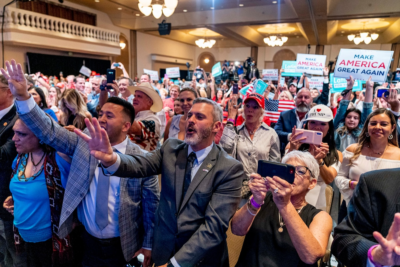 The evidence mounts: Hispanic voters are drifting toward the GOP. By Ruy Teixeira / Wash Post
The evidence mounts: Hispanic voters are drifting toward the GOP. By Ruy Teixeira / Wash Post
Supporters react as President Donald Trump speaks at a Latinos for Trump Coalition roundtable at Arizona Grand Resort & Spa in Phoenix on Sept. 14, 2020. (Andrew Harnik/AP Photo)
Catalist data confirm a nationwide shift among Latinos in 2020. The Democrats’ overall margin among this group dropped by 18 points relative to 2016. Cubans had the largest shift of 26 points, but Puerto Ricans moved by 18 points to Trump, Dominicans by 16 points and Mexicans by 12 points. An overall weak spot for Democrats was among Latino men who gave Trump a shocking 44 percent of their two-party vote in 2020. Read more
Related: Why are Vietnamese the most Republican-leaning Asian Americans? By Meena Venkataramanan / Wash Post
 ‘Unabashed’: Justice Jackson marks her first year on the Supreme Court unafraid to stake her own position. By / NBC News
‘Unabashed’: Justice Jackson marks her first year on the Supreme Court unafraid to stake her own position. By / NBC News
As the first Black woman to serve on the court, she brought a new perspective and spoke the most during oral arguments.
When the Supreme Court ruled in June against labor unions, allowing an employer to pursue a damages claim for losses caused by a strike, there was just one dissenting voice: Justice Ketanji Brown Jackson’s. “Today, the court falters,” Jackson wrote, adding that the decision “risks erosion of the right to strike.” Her lone dissenting vote was a notable moment in a high-stakes first term for the first Black woman to serve on the court. Although Jackson, 52, is clearly a solid part of the liberal minority on the 6-3 conservative-majority court, her opinion in Glacier Northwest v. International Brotherhood of Teamsters illustrated how she was forthright and eager to have her voice heard, even when she was out on her own. Read more
 Federal Judge Blocks Florida GOP Attack On Voter Registration Groups. By Liza Hearon / HuffPost
Federal Judge Blocks Florida GOP Attack On Voter Registration Groups. By Liza Hearon / HuffPost
“The Free State of Florida is simply not free to exceed the bounds of the United States Constitution,” a federal judge wrote.
In a 58-page ruling, U.S. District Judge Mark Walker said both a provision barring noncitizens from collecting voter registration applications and a provision mandating that such groups store applicant information were unconstitutional. “The challenged provisions exemplify something Florida has struggled with in recent years; namely, governing within the bounds set by the United States Constitution,” Walker wrote. Read more
 His friends believed he could have been the next MLK. A bullet took his life. By Suzette Hackney / USA Today
His friends believed he could have been the next MLK. A bullet took his life. By Suzette Hackney / USA Today
I’ve come to Seattle to look for somebody. His name is Elijah. Elijah Lee Lewis.
“He was catapulted into taking care of everyone else. I think that was something God gifted him with – the opportunity to lead, the opportunity to be the spark for the next generation.” Fynniecko Glover Jr., 26, friend. Read and listen here
Ethics / Morality / Religion
 Judge awards Black church $1 million after BLM banner burned by Proud Boys during protest. By AP and RNS
Judge awards Black church $1 million after BLM banner burned by Proud Boys during protest. By AP and RNS
The extremist group and its leaders were also barred from coming near the Metropolitan African Methodist Episcopal Church.
A judge on Friday awarded more than $1 million to a Black church in downtown Washington, D.C. that sued the far-right Proud Boys for tearing down and burning a Black Lives Matter banner during a 2020 protest. Read more
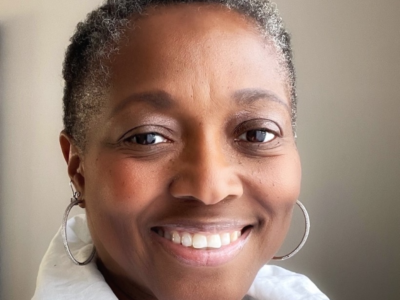 UCC elects first woman — and first woman of African descent — to lead denomination. By Emily McFarlan Miller / RNS
UCC elects first woman — and first woman of African descent — to lead denomination. By Emily McFarlan Miller / RNS
That Thompson is the first woman to lead the denomination may be surprising given the denomination’s progressive stances on women’s rights and many other issues.
The United Church of Christ elected its first female general minister and president on Monday (July 3) at its 34th General Synod in Indianapolis. The Rev. Karen Georgia Thompson’s election also makes her the first woman of African descent to lead the mainline denomination. “Today, United Church of Christ, we created a first together. It won’t be the last first,” Thompson, dressed in white, told delegates afterward. Read more
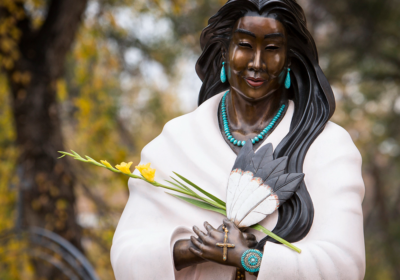 How my Catholic faith and Mohawk heritage teach me to embrace sustainable living. By Shauna’h Fuegen / NCR
How my Catholic faith and Mohawk heritage teach me to embrace sustainable living. By Shauna’h Fuegen / NCR
Detail view of the statue of St. Kateri Tekakwitha outside the Cathedral Basilica of St. Francis of Assisi in Santa Fe. This depiction of the Algonquin-Mohawk maiden by Jemez sculptor Estella Loretto has features and ornamentation representative of the Pueblo people. (CNS/Nancy Wiechec)
For many Catholics, the 2015 publication of Pope Francis’ encyclical “Laudato Si’, on Care for Our Common Home” was a watershed moment. In it, Francis reminds us that care for the environment is an essential component of living the Catholic faith, which sparked conversations within and outside of the Catholic Church about the necessity of living sustainably and in communion with the natural world. For me, the encyclical has also been an opportunity to explore the intersection of two important elements of my life: my Catholic faith and my experience as a Mohawk woman. Read more
 As a Rabbi, I’ve Had a Privileged View of the Human Condition. By David Wolpe / NYT
As a Rabbi, I’ve Had a Privileged View of the Human Condition. By David Wolpe / NYT
For over a quarter century now, I have listened to people’s stories, sat by their bedsides as life slipped away, buried their parents, spouses and sometimes their children.
After 26 years in the rabbinate, as I approach retirement, I have come to several realizations. All of us are wounded and broken in one way or another; those who do not recognize it in themselves or in others are more likely to cause damage than those who realize and try to rise through the brokenness. This is what binds together a faith community. No religious tradition, certainly not my own, looks at an individual and says: “There. You are perfect.” It is humility and sadness and striving that raises us, doing good that proves the tractability of the world and its openness to improvement, and faith that allows us to continue through the shared valleys. Read more
Historical / Cultural
 Frederick Douglass Knew What False Patriotism Was. By Esau McCaulley / NYT
Frederick Douglass Knew What False Patriotism Was. By Esau McCaulley / NYT
In 1852 Frederick Douglass delivered what may be his most famous address, “What to the Slave Is the Fourth of July?” This time of year, quotations from the speech dart around Black social media as a subtle pushback on uncomplicated celebrations of American independence.
Douglass wondered what the enslaved might say if they were called from the plantations to reflect on themes of liberty, justice and equality. How might their words differ from the prose of the free orators normally asked to comment on American ideals? There is a revolution in the reorientation of perspective, when the powerless are given space to speak. That hasn’t changed. Read more
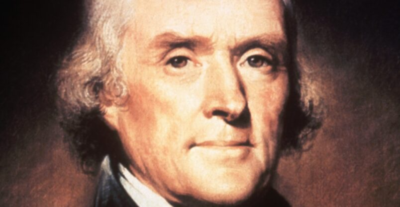 The Paragraph On Slavery That Never Made It Into The Declaration Of Independence. By Ben Railton / TPM
The Paragraph On Slavery That Never Made It Into The Declaration Of Independence. By Ben Railton / TPM
For one thing, Jefferson did directly engage with slavery in his initial draft of the Declaration. He did so by turning the practice of slavery into one of his litany of critiques of King George:
He has waged cruel war against human nature itself, violating its most sacred rights of life and liberty in the persons of a distant people who never offended him, captivating and carrying them into slavery in another hemisphere, or to incur miserable death in their transportation hither … And he is now exciting those very people to rise in arms among us, and to purchase that liberty of which he had deprived them, by murdering the people upon whom he also obtruded them: thus paying off former crimes committed against the liberties of one people, with crimes which he urges them to commit against the lives of another.
Like so much in the American founding, these lines are at once progressive and racist, admitting the wrongs of slavery but describing the slaves themselves as “obtruding” upon and threatening the lives of the colonists. Not surprisingly, this complex, contradictory paragraph did not survive the Declaration’s communal revisions, and the final document makes no mention of slavery or African Americans. Read more
Related: America Had More Than One Founding and More Than One Set of Founders. By Jamelle Bouie / NYT
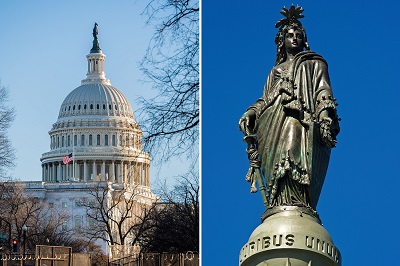 How an enslaved genius saved the Capitol dome’s ‘Freedom’ statue. By Gillian Brockell / Wash Post
How an enslaved genius saved the Capitol dome’s ‘Freedom’ statue. By Gillian Brockell / Wash Post
The U.S. Capitol is full of art: sculptures, portraits, murals depicting Founding Fathers, suffragist mothers and symbols of the nation’s ideals. Perhaps the grandest of these, standing atop the Capitol dome like a national wedding-cake topper, is the bronze “Statue of Freedom.” It wouldn’t exist without the artistry and genius of an enslaved man named Philip Reed.
The commission for the statue wasn’t just artistic; a bronze monument of this size had never been attempted in the United States. The only foundries big enough and craftsmen experienced enough for the project were in Europe. Mills hired a German metalworker to help him build a foundry and teach him and his team how to make molds and heat the furnace properly to cast bronze. The Jackson statue was unveiled to ecstatic fanfare in 1853, making Mills an overnight star, and rich. Read more
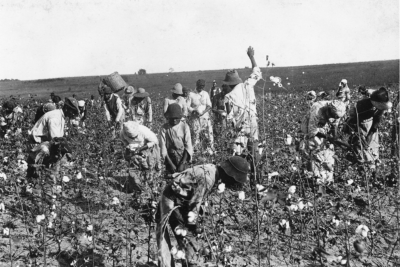 Florida Black History and the Horrors of Slavery Not Taught in Schools. By Jess Nelson / Miami New Times
Florida Black History and the Horrors of Slavery Not Taught in Schools. By Jess Nelson / Miami New Times
The horrors of slavery in United States history and its continued impact today are undeniable. Though Florida’s pristine beaches and palm trees aren’t typically regarded as part of America’s Deep South, the facts say otherwise.
The New York Times’ groundbreaking “1619 Project” examined the legacy of slavery on the 400th anniversary of the arrival of enslaved Africans to America’s 13 original colonies. But slavery existed in the Spanish colony of La Florida nearly a century earlier. On the eve of the American Civil War, half of Florida’s population were slaves, and Florida was the third state to secede from the Union and join the Confederacy in order to preserve slavery and white supremacy. Jim Crow laws were introduced during Reconstruction to enforce racial segregation in the apartheid state while the Ku Klux Klan, in full regalia, openly paraded on the streets of major Florida cities. Read more
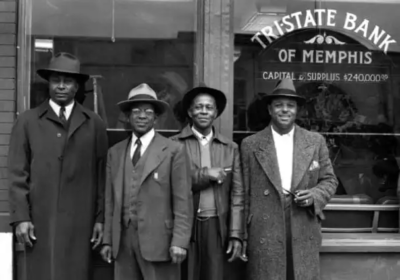 Black-owned banks, born out of post-slavery economic barriers, seek to address racial wealth gap. By Osej Serratos, Morgan Norwood, and Allie Weintraub / ABC News
Black-owned banks, born out of post-slavery economic barriers, seek to address racial wealth gap. By Osej Serratos, Morgan Norwood, and Allie Weintraub / ABC News
Some business owners and home buyers turn to Black-owned banks for funding.
The struggle to find capital isn’t new. After the end of slavery, Black Americans were largely shut out of American banks. Between 1865 and 1934, minority depositories, also known as Black-owned banks and credit unions, began to surface across the country as a result. Read more
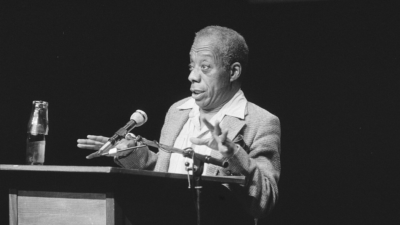 On the Anniversary of ‘The Fire Next Time.’ By David Shih / The Progressive
On the Anniversary of ‘The Fire Next Time.’ By David Shih / The Progressive
This year marks the sixtieth anniversary of the publication of James Baldwin’s The Fire Next Time, a book whose measure of the conscience of its readers, even now, holds true. Some will keep its words close, while others will choose to warp and spurn them.
The first essay, originally published in The Progressive in 1962, is written as a letter to Baldwin’s fifteen-year-old nephew. Its ten pages say enough about what we now call structural racism and white privilege to rouse even the laziest would-be censors to action. The second essay begins with the story of Baldwin rejecting his Harlem church and the fiction of security it promised, but it soon evolves into a full-throated rebuke of white Americans and their childish fantasies that he had outgrown. It’s a jeremiad to awe the Puritans and shame their latter-day imitators. Read more
 Remembering Louis Armstrong. By CBS News
Remembering Louis Armstrong. By CBS News
He answered to “Pops,” “Satchmo,” and “Louie.” But he called himself Louis.
Armstrong liked to say that he was born on the 4th of July, but he was actually born on August 4, 1901. “This idea that many African Americans were still patriotic, in spite of the way America treated them, is something I think that’s really important for people to understand about Louis Armstrong,” said Jenkins. In his documentary, “Louis Armstrong’s Black & Blues,” Jenkins explores how Armstrong, and his trumpet, navigated Prohibition, the Great Depression, world wars, and the civil rights era. “You’re the most famous person in the world, and you’re Black, but there’s still places you can’t go?” he said. “That must have been a real mind trick.” Read more
Sports
 Hockey Diversity Alliance’s Akim Aliu: NHL ‘late’ on inclusion. By AP and ESPN
Hockey Diversity Alliance’s Akim Aliu: NHL ‘late’ on inclusion. By AP and ESPN
Akim Aliu and his fellow members of the Hockey Diversity Alliance say they feel betrayed and confused by the NHL’s decision to launch — or as far as the HDA is concerned, relaunch — an inclusion committee to diversify the sport and make hockey more welcoming.
“I truly hope they do good work this time around, but I am tired of hearing empty announcements and photo ops to check a box instead of actually doing the hard work,” Aliu said. “My only message is don’t allow yourselves to be used by the league because that’s really what’s going to stall our movement.” Read more
 Venus Williams won the fight for equal prize money – that is her greatest Wimbledon legacy. By Charlie Eccleshare / The Athletic
Venus Williams won the fight for equal prize money – that is her greatest Wimbledon legacy. By Charlie Eccleshare / The Athletic
Whenever Venus Williams decides to end a professional tennis career that has already lasted nearly three decades, her greatest legacy at Wimbledon will not be her 11 titles (five singles, six doubles).
Nor will it be her astonishing longevity that has taken in a debut in 1997 and included, as it stands, 24 appearances at the tournament — despite battling numerous injuries and the auto-immune disorder Sjogren’s syndrome. It will be how she broke down racial and sexual barriers, and in particular played a pivotal part in one of the most important moments in Wimbledon’s history: the 2007 decision to award equal prize money to men and women. Read more
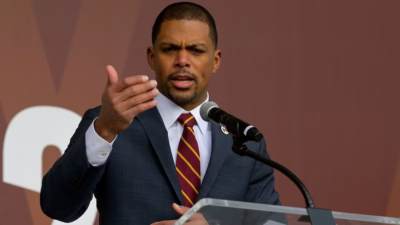 Commanders President Jason Wright expected to be retained after sale. By Nicki Jhabvala and Mark Maske / Wash Post
Commanders President Jason Wright expected to be retained after sale. By Nicki Jhabvala and Mark Maske / Wash Post
Jason Wright, a former NFL running back and partner at McKinsey & Company consulting, was hired as the Commanders’ president in August 2020. (John McDonnell/The Washington Post)
Washington Commanders President Jason Wright, who was hired in 2020 to improve the culture and business operations of the franchise, will be retained and given a chance to earn a continued role under new ownership once Josh Harris’s $6.05 billion purchase of the club from Daniel Snyder is approved as expected by NFL team owners and finalized in late July, two people with knowledge of the new owners’ strategy said. Read more
Site Information
Articles appearing in the Digest are archived on our home page. And at the top of this page register your email to receive notification of new editions of Race Inquiry Digest.
Click here for earlier Digests. The site is searchable by name or topic. See “search” at the top of this page.
About Race Inquiry and Race Inquiry Digest. The Digest is published on Mondays and Thursdays.
Use the customized buttons below to share the Digest in an email, or post to your Facebook, Linkedin or Twitter accounts.